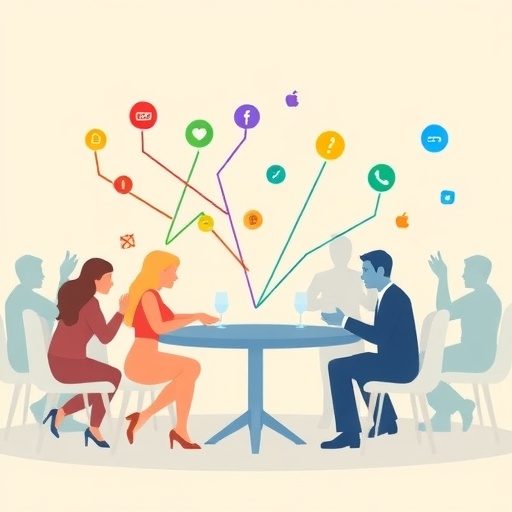The intricate web of human social interactions has long been a subject of fascination and study, blending insights from psychology, economics, and network science. New research has taken a pioneering approach to understanding how individuals navigate their social networks and the implications of these navigations in cooperative behaviors. By integrating traditional economic games, such as the prisoner’s dilemma, trust game, and ultimatum game, researchers have ventured into uncharted territories of human behavior, examining not just outcomes but the mechanics of social agency that influence these outcomes.
In conventional studies of economic games, players often find their choices restricted, limiting their ability to interact flexibly with different social neighbors. These limitations raise important questions about the authenticity of social behavior examined in these games. Are the results merely artifacts of constrained choices? To explore these questions, the researchers devised an innovative experimental paradigm that grants participants a richer agency in their social networking capabilities. By allowing individuals increased flexibility in their interactions, they aimed to replicate more genuine social behavior reflective of real-world dynamics.
The findings from this study are ground-breaking, revealing that when participants are granted greater agency over their social networks, there is a notable uptick in prosocial behaviors across all three economic games analyzed. Participants not only exhibited higher cooperation in the prisoner’s dilemma but also demonstrated elevated levels of trust in the trust game and greater fairness in the ultimatum game. This correlation between social networking agency and prosocial conduct emphasizes a significant shift in understanding human social exchange.
Moreover, the study indicated that increased prosocial behavior leads to tangible benefits: participants who experienced greater agency in their social interactions accrued higher levels of wealth while also contributing to lower inequality among themselves. This realization adds a compelling layer to the narrative surrounding economic games; it is not merely the designs of the games that dictate outcomes but significantly the way players are allowed to maneuver their social environments.
This research opens the door to a plethora of implications for both theoretical and practical realms. The findings suggest that the traditional approach to studying social behavior might be missing critical components that could influence cooperative strategies in societies. The constraints placed on players in many experiments could create a skewed understanding of how and why people choose to cooperate or compete. As researchers delve deeper into these dynamics, they may uncover new strategies to foster collaboration and trust among individuals and within larger groups.
Furthermore, from a policy perspective, the implications of harnessing social networking agency could guide interventions in various spheres, including education, community building, and conflict resolution. If we train individuals to recognize and utilize their social connections more effectively, it could ripple through communities, creating stronger bonds and diminishing disparities. The data emerging from this research could equip practitioners with the tools necessary to cultivate more inclusive and equitable environments, further enhancing social welfare.
In an era where social media and digital networking dominate interpersonal interactions, understanding the role of networking agency becomes increasingly critical. As individuals navigate these complex systems, recognizing the potential of their social networks can lead to improved outcomes, not just on a personal level but for society as a whole. The ability to leverage social connections for mutual benefit has never been more vital, providing a framework for addressing current societal challenges, including economic disparities and social isolation.
Conclusively, the research elevates the discourse surrounding human cooperation by positing agency as a central factor in facilitating prosocial behavior. By reframing experiments to incorporate individual agency in social networking, researchers are better equipped to analyze the subtle nuances of human interaction. The posture of restricting social choices may not only limit understanding but also inhibit the potential for cooperation, trust, and fairness to flourish.
The authors—D. Jia, I. Romić, and L. Shi—along with their colleagues, have started a conversation that challenges conventional wisdom and invites further exploration into the myriad ways in which agency influences social behavior. This research is positioned to inspire future studies that may further unveil the complexities of human interactions, potentially leading to transformative applications in social policy, community engagement, and beyond.
As we stand at the intersection of social psychology and network science, the revelations from this study serve as a call to re-evaluate how we approach the study of human social behavior. It is no longer just about the decisions made in isolation, but rather how individuals can navigate their interconnected web of relationships to foster outcomes that are more collaborative and equitable for all.
Subject of Research: The relationship between social networking agency and prosociality in economic games.
Article Title: Social networking agency and prosociality are inextricably linked in economic games.
Article References:
Jia, D., Romić, I., Shi, L. et al. Social networking agency and prosociality are inextricably linked in economic games. Nat Hum Behav (2025). https://doi.org/10.1038/s41562-025-02289-0
Image Credits: AI Generated
DOI: 10.1038/s41562-025-02289-0
Keywords: Social networking agency, prosocial behavior, economic games, cooperation, trust, social dynamics.




